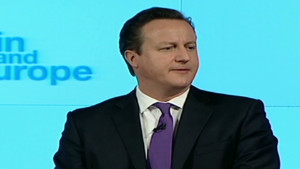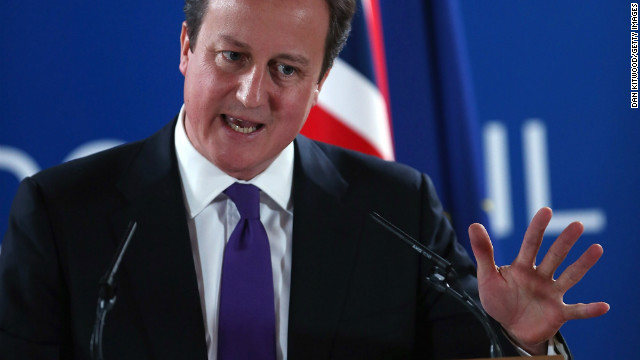By Jim Pickard, FT.com
(Financial Times) -- David Cameron, Ed Miliband and Nick Clegg have an uphill struggle before any EU referendum according to a poll that says only one in three would vote to stay in the bloc.
The findings, which are likely to spark alarm in pro-European circles, suggest that anti-Brussels sentiment is sweeping through the British public.
Given an in-out referendum on EU membership tomorrow, 50 per cent would vote "out" against 33 per cent "in" and 17 per cent who would not vote either way, according to the poll by Harris Interactive for the Financial Times.
Mr Cameron, who had resisted calls to hold a referendum, finally bowed to pressure last month by promising that a Tory government would do so in 2017.
 British PM promises vote on EU
British PM promises vote on EU
 Sorrell on UK economy, referendum
Sorrell on UK economy, referendum
 Sorrell: Cameron's speech not positive
Sorrell: Cameron's speech not positive
The Conservative leader said if his party won the next election he would seek to repatriate various powers from Brussels before putting EU membership to the public.
The prime minister, who would campaign for an "in" vote, said he had "no illusions about the scale of the task ahead", a comment borne out by the Harris poll of 2,114 adults, conducted between January 29 and February 6.
The promise of a plebiscite is very popular with the electorate, with 50 per cent supporting the decision and only 21 per cent opposing it.
Mr Cameron has delighted his backbenchers with the move, designed in part to stave off a potential electoral threat from a resurgent UK Independence party.
It would be the first national referendum on Europe since 1975 when Harold Wilson, the Labour prime minister, put membership of the European Economic Community to the public.
But Mr Cameron has also stoked nervousness in Paris, Berlin and Washington from allies concerned about the risk of a Tory government accidentally finding itself outside the EU.
The prime minister believes that he will be able to convince the public of the merits of staying in the EU so long as he can renegotiate the relationship.
Yet of those who would vote "out", only 12 per cent said they would "definitely" change their minds if there was a successful renegotiation. Another 47 per cent said "yes, possibly" to the idea that they could alter their vote. But 41 per cent of those wanting Britain to leave would definitely not change their point of view.
David Cameron is under pressure from all sides and faces a delicate balancing act to try to renegotiate an acceptable UK membership settlement with the EU
There is no certainty that Mr Cameron would be able to repatriate all, or even most, of the powers he wants -- such as fisheries, business regulation and policing.
Immigration and justice are the two policy areas a large majority, 70 per cent, of Britons see as either very, or extremely, important to repatriate from the EU, according to the poll findings.
The British establishment would unite behind a "yes" campaign if a vote occurs in 2017, with the unions and CBI employers' group signalling that they would join the Tory, Labour and Lib Dem leaderships in doing so.
Some 45 per cent of voters believe Britain still benefits from its EU membership while only 34 per cent think it does not, according to the poll. Likewise, 86 per cent are at least somewhat concerned that the economy will be undermined by uncertainty over membership.
Yet only 31 per cent believe the UK's economy would be weaker outside the organisation, according to Harris.
In theory the overall findings should put a spring in the step of Ukip, which hopes to come second or even first in the European elections in 2014. Yet only 10 per cent of those polled were "very or extremely confident" that Nigel Farage, the Ukip leader, could get the best deal for the UK in the EU -- compared to 16 per cent for Mr Cameron.
Meanwhile only 11 per cent of voters were more likely to back Ukip since the promise of an in-out referendum -- while 25 per cent were less likely to support the party.
Harris found that voters ranked the EU at only 14th in a list of 15 priorities for the UK, with healthcare, education and economic growth in the first three slots.
source
please give me comments thanks
British PM David Cameron faces a delicate balancing act in renegotiating an acceptable UK membership settlement with the EU.
(Financial Times) -- David Cameron, Ed Miliband and Nick Clegg have an uphill struggle before any EU referendum according to a poll that says only one in three would vote to stay in the bloc.
The findings, which are likely to spark alarm in pro-European circles, suggest that anti-Brussels sentiment is sweeping through the British public.
Given an in-out referendum on EU membership tomorrow, 50 per cent would vote "out" against 33 per cent "in" and 17 per cent who would not vote either way, according to the poll by Harris Interactive for the Financial Times.
Mr Cameron, who had resisted calls to hold a referendum, finally bowed to pressure last month by promising that a Tory government would do so in 2017.
 British PM promises vote on EU
British PM promises vote on EU Sorrell on UK economy, referendum
Sorrell on UK economy, referendum Sorrell: Cameron's speech not positive
Sorrell: Cameron's speech not positiveThe Conservative leader said if his party won the next election he would seek to repatriate various powers from Brussels before putting EU membership to the public.
The prime minister, who would campaign for an "in" vote, said he had "no illusions about the scale of the task ahead", a comment borne out by the Harris poll of 2,114 adults, conducted between January 29 and February 6.
The promise of a plebiscite is very popular with the electorate, with 50 per cent supporting the decision and only 21 per cent opposing it.
Mr Cameron has delighted his backbenchers with the move, designed in part to stave off a potential electoral threat from a resurgent UK Independence party.
It would be the first national referendum on Europe since 1975 when Harold Wilson, the Labour prime minister, put membership of the European Economic Community to the public.
But Mr Cameron has also stoked nervousness in Paris, Berlin and Washington from allies concerned about the risk of a Tory government accidentally finding itself outside the EU.
The prime minister believes that he will be able to convince the public of the merits of staying in the EU so long as he can renegotiate the relationship.
Yet of those who would vote "out", only 12 per cent said they would "definitely" change their minds if there was a successful renegotiation. Another 47 per cent said "yes, possibly" to the idea that they could alter their vote. But 41 per cent of those wanting Britain to leave would definitely not change their point of view.
David Cameron is under pressure from all sides and faces a delicate balancing act to try to renegotiate an acceptable UK membership settlement with the EU
There is no certainty that Mr Cameron would be able to repatriate all, or even most, of the powers he wants -- such as fisheries, business regulation and policing.
Immigration and justice are the two policy areas a large majority, 70 per cent, of Britons see as either very, or extremely, important to repatriate from the EU, according to the poll findings.
The British establishment would unite behind a "yes" campaign if a vote occurs in 2017, with the unions and CBI employers' group signalling that they would join the Tory, Labour and Lib Dem leaderships in doing so.
Some 45 per cent of voters believe Britain still benefits from its EU membership while only 34 per cent think it does not, according to the poll. Likewise, 86 per cent are at least somewhat concerned that the economy will be undermined by uncertainty over membership.
Yet only 31 per cent believe the UK's economy would be weaker outside the organisation, according to Harris.
In theory the overall findings should put a spring in the step of Ukip, which hopes to come second or even first in the European elections in 2014. Yet only 10 per cent of those polled were "very or extremely confident" that Nigel Farage, the Ukip leader, could get the best deal for the UK in the EU -- compared to 16 per cent for Mr Cameron.
Meanwhile only 11 per cent of voters were more likely to back Ukip since the promise of an in-out referendum -- while 25 per cent were less likely to support the party.
Harris found that voters ranked the EU at only 14th in a list of 15 priorities for the UK, with healthcare, education and economic growth in the first three slots.
source
please give me comments thanks


 9:07 PM
9:07 PM
 admin
admin





0 comments:
Post a Comment